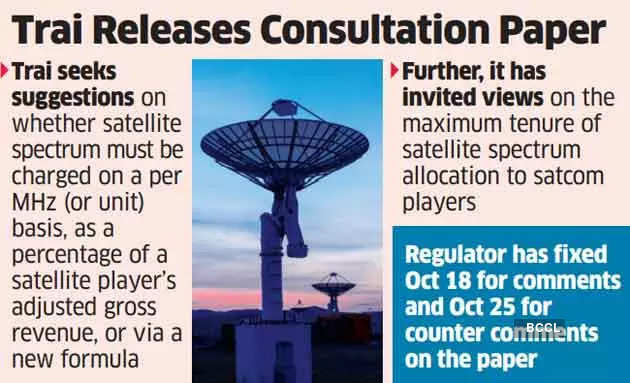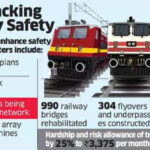NEW DELHI: The telecom regulator has sought views on the pricing methodology and terms and conditions of allocating satellite spectrum — without auctions — to companies seeking to launch satellite broadband services in the country.
Global biggies such as Bharti Group-backed Eutelsat OneWeb, Amazon-backed Kuiper, Elon Musk’s Starlink, Globalstar and the Reliance-SES combine are keen to enter India’s nascent satcom market that offers high growth potential.
The much-awaited discussion paper from the Telecom Regulatory Authority of India (Trai) has sought suggestions on whether such satellite spectrum must be charged on a per MHz (or unit) basis, or as a percentage of a satellite player’s adjusted gross revenue (AGR), or via a new formula.
The paper underlined a portion of the Department of Telecommunications’ July 2024 reference on satellite spectrum pricing, calling on the regulator to revisit an earlier recommendation to cut spectrum usage charges (SUC) for VSAT-based satcom operators to 1% of AGR from 4% now. The department had also told Trai to assess if this needs to be maintained or increased to ensure a level-playing field between satellite broadband players and terrestrial mainline telcos such as Reliance Jio, Bharti Airtel and Vodafone Idea (Vi).
Trai highlighted it because it recently mooted a single authorisation for satellite telecommunications and removal of an extant restriction on VSAT operators – to provide services only to a closed user group (CUG). It, in fact, has pushed for broadening the scope of satellite services by suggesting the merging of the VSAT and the Global Mobile Personal Communications by Satellite (GMPCS) satcom permits.
The department feels a question arises if the issue of percentage of AGR, previously recommended by Trai for commercial VSAT service – which is a geostationary orbit (GSO)-based fixed satellite service – needs to be re-examined, Trai said. “DoT has requested to take this into consideration while providing recommendations to its present reference on the subject,” the regulator said in its paper.
According to Trai, DoT feels it’s “essential to examine whether a level-playing field exists” between terrestrial access service providers and satellite players planning to offer fixed and mobile satellite services in India via low-earth orbit (LEO), medium earth orbit (MEO) and geostationary orbit (GEO) global satellite systems.
Accordingly, the government believes if post-this examination, spectrum charges are to be levied as a percentage of AGR, the percentage previously recommended by Trai “may need to be reassessed”.
Source: The Economic Times

 Railways Floats Tenders For Placing Kavach On 9,600 Km Of Tracks
Railways Floats Tenders For Placing Kavach On 9,600 Km Of Tracks 